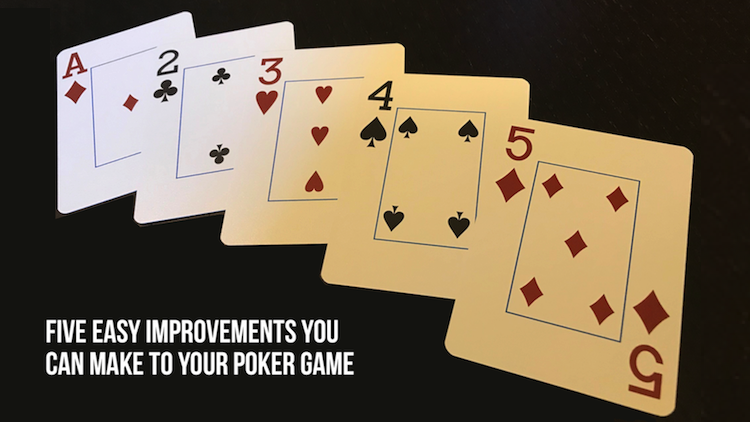Most types of poker are relatively easy to learn. Improving your skills and bettering your results can be easy, too, although building an edge over your opponents does require a little extra effort.
Here are five relatively easy things you can start doing right now to improve your poker game.
1. Analyze your own game
You hear a lot about “active” versus “passive” learning, and how the former is so much better than the latter.
Imagine you’re watching a movie, something most of us will do as a way to entertain ourselves, not to educate ourselves. Now imagine you have to write a review of the movie afterwards, like a critic might. Knowing that should change how you interact with the film. Now you’re paying attention to details, perhaps even taking notes to help you later when you have to write your review. You aren’t viewing the movie “passively,” anymore, but “actively.”
Some players play poker passively, not actively. Especially when playing online, it is easy to avoid analyzing your own decision-making too closely and even kind of “watch” yourself click buttons without any sort of critical reflection.


Play as though you have to write a “review” of your game afterwards, like a movie critic. Post-session reviews are great, of course, but even if you don’t actually review your play afterwards, play as if you plan to do so. That will force you to pay more attention to individual decisions, which in turn will produce all sorts of other benefits.
That will also at least give you a chance to educate (and not just entertain) yourself as you play.
2. Study what others are doing
Being more “active” and paying more attention to what you are doing should also put you in a better position to recognize what your opponents are doing at the table, too. But don’t just limit this “study” to those you battle against for pots. Study what everyone is doing — good and bad players alike.
You’ve heard this before, but it’s good not to disengage with what is going on after you fold your own hand. Watch your opponents. Note which hands the stronger players are playing and from what positions, and consider their betting frequency and sizing. Do the same with weaker players.
Perform this study not just to arm yourself with information for when you subsequently get into hands with these players, but also to recognize why the strong players are winning and the weak ones are losing.
3. Keep records of your play
On a list of “easy improvements” you can make, this might be the easiest one. But it does require both a little discipline and a lot of honesty.
For a poker player, record-keeping can include keeping track all sorts of things, but truthfully there are a only a few details from each cash game session or tournament that are essential to record.


For cash games, you want to keep track of profit or loss, time played (in hands or minutes/hours), and game format and stakes. For tournaments, note the amount spent on buy-ins (including all re-buys or re-entries), the game format, and your results (how much you cashed for, or if you didn’t cash).
There’s a lot of other information you can also record, including the venue or online site and other variables that could be potentially meaningful (time of day, day of the week, etc.). But simply keeping track of these items will reveal a couple of important things that can help improve your game.
For one, you’ll be keeping track of your bankroll, which is absolutely necessary to help you practice sound bankroll management.
Also, you’ll be able to recognize at a glance which games and stakes are good for you, and which ones are less so. You may not even realize how much you’re losing in PKO tournaments, or how much you’re winning in spin-n-go’s.
Having this information can help you decide which games you should be playing more and which you should be playing less (or not at all). It can also help you decide which game types and formats you need to study more closely than others.
4. Further your poker education with books, forums, and videos
With this suggestion we move into slightly less “easy” ways to improve, but still not all that difficult.
Ask anyone who played poker seriously a generation ago, and you’ll hear them tell you how much “easier” players have it today when it comes to having access to learning materials.
There are tons more poker strategy books now than was the case even 20 years ago — here are some of the best poker books with which to get started. Poker forums are not hard to find either, with most including very information-rich stategy sections and threads just a few mouse clicks.
Videos and live streams can be a great resources as well. To help you get started there, we can point you to the PokerStars School page on YouTube where there are hundreds of free videos on a huge variety of strategy topics.
You can also check out the PokerStars School website for even more content arranged into separate “courses” and other topics.
Don’t forget as well the PokerStars Twitch streams, including the cards-up coverage of the Stadium Series that just kicked off this week. For a guide on how to get the most out of both PokerStars School and the Stadium Series streams, click here.
5. Review hands with a friend or community of players
Finally, poker is not a “team game,” but you often find the best players rarely “go it alone” when it comes to finding ways to improve as players. Being part of a community of other players, or even just having a single buddy with whom to discuss hands or situations, can be a great way to encourage the sort of self-reflection and self-study we’re recommending here to improve your game.


Home games can actually provide this very kind of support. While you probably don’t want to talk too much strategy during the games themselves, breaking down hands with fellow players in between home games can be a great way to add to your knowledge and improve.
Even the act of just narrating a hand you have played to someone else can be a useful exercise, forcing you to remember details and recount reasons for choices you’ve made. Getting feedback can be beneficial as well, even if it is just to gather a second opinion.
Back to Top







